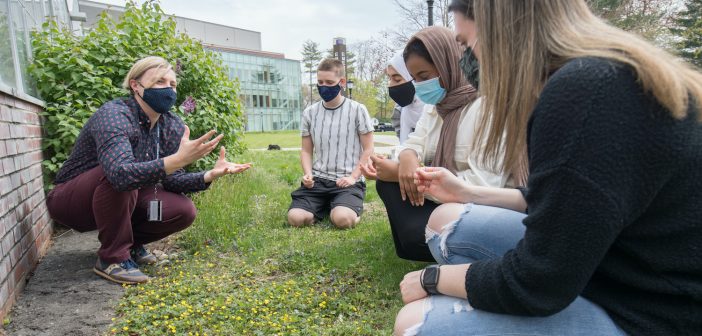By Troy Watkins
As the world population becomes more diverse and the need for equitable practices increases, Westfield State has taken important steps over the past year to address these issues.
In October 2020, the University became one of the seven charter members of SEA Change—an initiative of the American Association for the Advancement of Science to support colleges and universities as they transform themselves into diverse, equitable, and inclusive institutions.
SEA (STEMM Equity Achievement) Change supports institutions through a rigorous self-assessment process to investigate their own culture, policies, and procedures that stand in the way of access and success for students, faculty and staff from groups marginalized in STEMM (Science, Technology, Education, Math and Medicine). From this self-assessment, Westfield State will create an action plan for the University.
The charter members have publicly committed to creating sustainable changes to recruit, retain, and advance diverse talent in STEMM. Part of a select group, the other institutions—including North Carolina State, Arizona State, and University of Florida—all have an enrollment of more than 35,000 students, while Westfield State has fewer than 6,000.
“We’re thrilled to be part of an initiative that can help us connect with others, have some foundational conversations about our efforts, and conduct a thorough analysis of our institution,” says Jennifer Hanselman, Ph.D., dean of the Westfield State’s College of Mathematics and Sciences.
“The WSU institutional team, comprised of faculty from all STEMM departments and staff from units across campus, including Student Affairs, is working to understand where we are as an institution, and scale up,” says Hanselman.
After taking a Diversity and the Law course administered by AAAS, SEA Change participants are more aware of the guidelines and limitations of what could be accomplished.
“By first understanding the laws that govern us, we can address issues in admissions and hiring practices, and have Westfield State STEMM faculty interact with staff from the University’s Student Affairs and Institutional Research offices to put our data in context and become aware of the full student experience,” says Hanselman. “The process requires close attention to detail so we can adopt changes to facilitate long-term success in personal and professional growth for all.”
The institutional team will identify needs and will work within the University’s guidelines to make appropriate adjustments to policies and practices to make changes needed to help improve students’ success.
“We need to listen to students to ensure we are meeting our goals,” says Hanselman. “Beyond analyzing data, all students need to feel that they are welcome, respected, and empowered to reach their goals.”
In addition to SEA Change, Westfield State is also addressing similar issues through other initiatives.
The University launched a Racial Equity and Justice Institute Team and joined the Leading for Change Higher Education Racial Equity and Justice Institute (a voluntary 30-member consortium based at Bridgewater State University), pledging to help dismantle systemic barriers to opportunity and combat injustices faced by communities of color on college campuses. For more information and progress updates, visit westfield.ma.edu.




